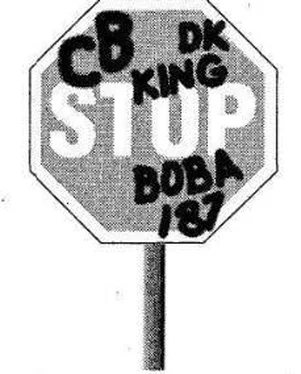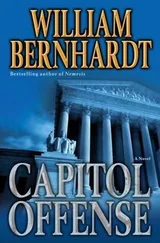“I don’t think so.” Ben hated this. It was more like being in the boxing ring than putting on a defense. But he had to keep it up until he got what he needed. “You would never allow those boys to work in your dining room. You’re a deeply prejudiced person.”
“Another lie!”
“You have no minority employees working in the main club building, right?”
“We had some black caddies.”
“And that was darned big of you, but I’m asking about the real employees. The full-timers. No minorities, right?”
He sank back in his chair. “Well, that’s why I started my affirmative-action program.”
“Wrong. I heard your phone conversation when you were talking to the employment agency. You told them you weren’t interested in any non-Caucasians.”
“I said no such thing.”
“Not in so many words, maybe, but you communicated the message, just the same. I was suspicious at the time, so I made notes and later consulted a friend of mine at the EEOC. Turns out code phrases like yours are commonly used to communicate illegal hiring preferences.”
Pearson’s eyes broke contact. “I don’t know what you’re talking about.”
Ben glanced at his notes. “For instance, you said, ‘Let me talk to Mary. No, not Maria. Not Rochelle.’ That meant you wanted to hire Caucasian women, no Hispanics, no blacks. Then you said, ‘Let me have suites fifteen through twenty-five.’ That meant you wanted young women, ages fifteen through twenty-five.”
“The guys in the clubhouse like to look at the pretty young things, okay? After a hard day’s work at the …”
“Nineteenth tee?” Ben suggested.
Pearson pulled himself up, jaw tightly clenched. “There’s nothing wrong with hiring attractive young women to be waitresses. Everyone does it.”
“And excluding minorities?”
“Look, it’s a private club. We can do whatever the hell we want.”
“Maybe so, but the point is, there’s not a snowball’s chance that you were going to hire a bunch of big tough black gang members as waiters. They were there to deliver or pick up drugs.”
“You’ll never prove that!” Pearson’s defiant voice echoed through the courtroom.
Maybe not, Ben thought, but the jury was listening, just the same. He decided it was time to switch subjects. “You do a lot of traveling to Peru, don’t you?”
Pearson’s head twitched, startled by the sudden switch in topics. “I suppose.”
“I understand a lot of illegal drugs come from Peru.”
“Oh, well then, I guess that proves I’m a drug lord.”
“Wasn’t Maria Alvarez also from Peru?”
“I—think I might have heard that. So what?”
So what indeed? Ben wasn’t sure, but it was a hell of a coincidence.
“Did you know her?”
“No, not at all.”
“Never?”
“I never laid eyes on her till the police brought around pictures of her corpse.”
This was getting Ben nowhere. He rethought his approach. What was it his mother had told him? Give the man something to brag about, that was it. Hmmm.
“What sort of business do you do in Peru?”
“All kinds of things.”
“You must be a very enterprising individual, to build a successful business enterprise in a third-world nation.”
Pearson seemed to relax a bit. “I’ve done all right, yeah.”
“From what I’ve seen, you’ve done extremely well. What inspired you to instigate operations in Peru? Most people would never have thought of that.”
Pearson leaned back in his chair. “Well, the advantages aren’t obvious, but after a lot of hard work and bare-knuckles research, I realized there was some serious money to be made. Labor down there is cheap, and the government tends to stay out of your way, unlike here.”
“I see. Could you briefly describe the scope of your business empire?”
Pearson turned to the jury and shrugged his shoulders. Now that he was on a subject he loved, he actually seemed to be enjoying himself. “Most of my work is energy-related. I’ve invested in oil wells. Bought some oil fields. Operated a gas processing plant for a while.”
“Anything else?”
“Oh, hell. I’ve bought and sold small businesses. Bought some polo ponies. Real estate. I’ve made investments for myself, and I’ve acted as a broker for others.”
It was the word that triggered Ben’s memory. The same word Rachel Rutherford had used when she referred to the unnamed lover who had assisted her in her time of need.
“What kind of broker?”
“Oh, hell. I don’t know. Land. Leasehold interests. Stocks. Bonds.”
“What about babies?”
Pearson’s sudden silence resounded through the courtroom. The air seemed suspended, as if time had decided to stand still.
“Don’t bother lying,” Ben said, bluffing his way through. He was putting all his chips on one roll of the dice now. “She told me all about it.”
“I did that on one occasion,” Pearson said quietly.
It was him. “How did you get into the baby business?”
“I was requested to … by a close personal friend.”
“A lover?”
Pearson looked back at him blank-faced. “I don’t see what that has to do with anything.”
Ben decided to leave well enough alone. “Why were you looking for babies in Peru?”
“You probably know how hard it can be for certain people to adopt in America,” Pearson explained. “Birthrates are down. Abortion is up. No one seems to care if a kid is illegitimate anymore. For every American baby put up for adoption, there are four couples waiting in line. Obviously, a lot of those people are going to be disappointed.”
“So you looked overseas?”
“Exactly. Ten years ago the foreign market for babies was just opening up. Today, it’s a steady supply source. I’ve been told that, on average, twenty American couples adopt overseas babies every day.”
“How did you go about this … brokering?”
“I contacted an outfit in Houston called the Santa Clara International Adoption Agency. I filled out the forms, ran through all the hoops. Eventually they turned down the couple I represented for the same reason the American agencies had. The father was too old, too inexperienced. But I got friendly with one of the men who worked there, spilled a little cash, bought him a few shots of tequila, and got some information.”
“About what?”
Pearson breathed heavily, as if resigned to telling his story but not at all happy about it. “La Flavita.”
“And what is that?”
“That’s a hotel in one of the scuzziest parts of Peru. A neighborhood I would’ve never dreamed of visiting otherwise.”
“And what was at the hotel?”
“A baby farm.”
“Your honor.” Bullock rose to his feet. “This story is appropriately lurid and distracting—Mr. Kincaid’s specialties—but it has nothing to do with this case. The court has been very patient, but enough is enough.”
“Judge,” Ben said, “I promise this will connect up.”
Hawkins squinted. “I don’t see how.”
“Your honor, my client is on trial for his life. I ask for the widest possible latitude.”
Hawkins glanced at all the reporters in the gallery, then sank back into his seat. “Proceed.”
Ben stood directly before Pearson. “Did you go to this … baby farm?”
“Of course. It was a pathetic sight, believe me. Not just Peruvian kids. They had castaways and bastards from all over the world. Kids no one wanted. The dust of life.”
“Did you have to fill out forms?”
“Nope. All I had to do was open my wallet.”
“Did you obtain parental consent?”
“I was told they had done so. Of course, you have to realize this is a third-world country. Parental consent is a whole different animal there. Some poor schmo who has six kids he can’t feed might well give consent to sell his seventh, if it enables him to feed the rest of the brood for a few weeks. He might not like it, but he’ll do it.”
Читать дальше







